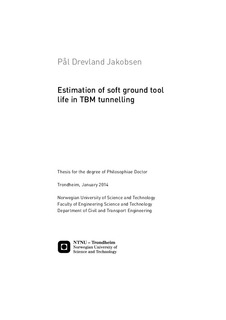Estimation of soft ground tool life in TBM tunnelling
Doctoral thesis
Permanent lenke
http://hdl.handle.net/11250/232808Utgivelsesdato
2014Metadata
Vis full innførselSamlinger
Sammendrag
Increased urbanisation constantly demands more infrastructure, often requiring the construction of tunnels and facilities underground. The complexity of Tunnel Boring Machine (TBM) function and the complicated nature of soft ground and soil working environments make the estimation of wear a challenging issue. The following tests and procedures are included in the original contribution to this PhD study; 1) an overview and presentation of various laboratory methods designed to estimate and assess soil abrasivity in connection with soft ground TBM tunnelling, 2) the development of models, based on simplified laboratory tests, for the estimation of TBM tool life when excavating soil and soft ground, 3) the development of the Soft Ground Abrasion Tester (SGAT), designed to increase the validity of simplified estimation tools. The simplified laboratory tests incorporate the Soil Abrasion Test (SAT™), quartz content measurements, and the geotechnical uniformity index Cu. Test results have been correlated with, and validated against, TBM tool life and performance data from 16 TBM projects. Laboratory test results obtained from the SAT™ provide a good estimation of soft ground excavation tool life. Furthermore, an empirical formula obtained by means of multiple regression analysis using SAT™ and Cu values as variables, and soft ground tool life as the dependent variable, has been derived, and provides a good estimation of soft ground excavation tool life. In addition, the validity of the formula is evaluated against an on-going European TBM tunnelling project. The SGAT has been developed in order to study how variation in geotechnical parameters such as soil compaction and density, water content, groundwater pressure and soil conditioning additive’s influence the abrasivity of soils. Furthermore, the SGAT provides opportunities to measure the influence of abrasive wear by varying TBM parameters such as thrust, rpm and torque. The main results obtained from the SGAT are that the moisture content of a soil sample, and thus its compactibility, influences soil abrasivity by as much as ±250%. There is a clear correlation between measured weight loss and torque requirement, and a reduction of torque by approximately 40% is achievable with proper soil conditioning. In addition, measured wear can be as low as 20% of that for an unconditioned sample. Research results have been achieved mainly by using the following four approaches, 1) literature studies, 2) laboratory tests, 3) field research, and 4) discussions and experience sharing with individuals, users and experts in the tunnelling industry. These methods were chosen since they offer a variety of approaches to the complex problem of soil abrasivity in soft ground TBM tunnelling, and to avoid an exclusive focus on any single source such as ideal laboratory tests, published literature or field experience.
Består av
Dahl, Filip; Bruland, Amund; Jakobsen, Pal Drevland; Nilsen, Bjorn; Grov, Eivind. Classifications of properties influencing the drillability of rocks, based on the NTNU/SINTEF test method. Tunnelling and Underground Space Technology. (ISSN 0886-7798). 28: 150-158, 2012. 10.1016/j.tust.2011.10.006.Jakobsen, Pål Drevland; Dahl, Filip. Soil Abrasion in TBM tunnelling. Korean Tunnelling Association Mechanized Tunnelling Symposium, 2010.
Jakobsen, Pal Drevland; Bruland, Amund; Dahl, Filip. Review and assessment of the NTNU/SINTEF Soil Abrasion Test (SAT (TM)) for determination of abrasiveness of soil and soft ground. Tunnelling and Underground Space Technology. (ISSN 0886-7798). 37: 107-114, 2013. 10.1016/j.tust.2013.04.003.
Jakobsen, Pål Drevland; Becker, Tim E. E.. Tunnelling in abrasive soils - review of a tunnel project in Germany. The 13th KTA International Symposium on Mechanized Tunnelling Technology, 2012.
Becker, Tim E. E.; Jakobsen, Pål Drevland. Overview of pipe-jacking performance - review of tunnel projects. NO-DIG Berlin 2013: Paper 2A-2, 2013.
Jakobsen, P. D.; Lohne, J.. Challenges of methods and approaches for estimating soil abrasivity in soft ground TBM tunnelling. Wear. (ISSN 0043-1648). 308(1-2): 166-173, 2013. 10.1016/j.wear.2013.06.022.
Jakobsen, Pål Drevland. Overview of Methods and Approaches used at NTNU/SINTEF to Estimate Soil Abrasivity in TBM Tunnelling. NORDTRIB proceedings, 2012.
Jakobsen, Pål Drevland; Langmaack, Lars; Dahl, Filip Erik Bo; Breivik, Torkjell. Predicting the abrasivity of in-situ like soils. Tunnels and Tunnelling International. (ISSN 1369-3999). 6: 41-46, 2012.
Jakobsen, Pal Drevland; Langmaack, Lars; Dahl, Filip; Breivik, Torkjell. Development of the Soft Ground Abrasion Tester (SGAT) to predict TBM tool wear, torque and thrust. Tunnelling and Underground Space Technology. (ISSN 0886-7798). 38: 398-408, 2013. 10.1016/j.tust.2013.07.021.
Langmaack, Lars; Grothen, Brad; Jakobsen, Pål Drevland. Anti-wear and anti-dust solutions for hard rock TBMs. World Tunnelling Congress, 2010.
Espallargas, Nuria; Jakobsen, Pål Drevland; Langmaack, Lars; Macias Rico, Francisco Javier. Influence of Corrosion on the Abrasion of Cutter Steels Used in TBM Tunnelling. Rock Mechanics and Rock Engineering. (ISSN 0723-2632), 2014. 10.1007/s00603-014-0552-6.
Grøv, Eivind; Jakobsen, Pål Drevland; Kane, Alexandre; Hoang, Hieu; Smading, Steve; Sagen, Trine Bye. TBM Cutter Steel - a challenge for Norwegian steel suppliers. Tunnelling journal / the international journal for the tunnelling industry. (ISSN 2044-0758 , 2044-074x). June/July: 40-45, 2013.
